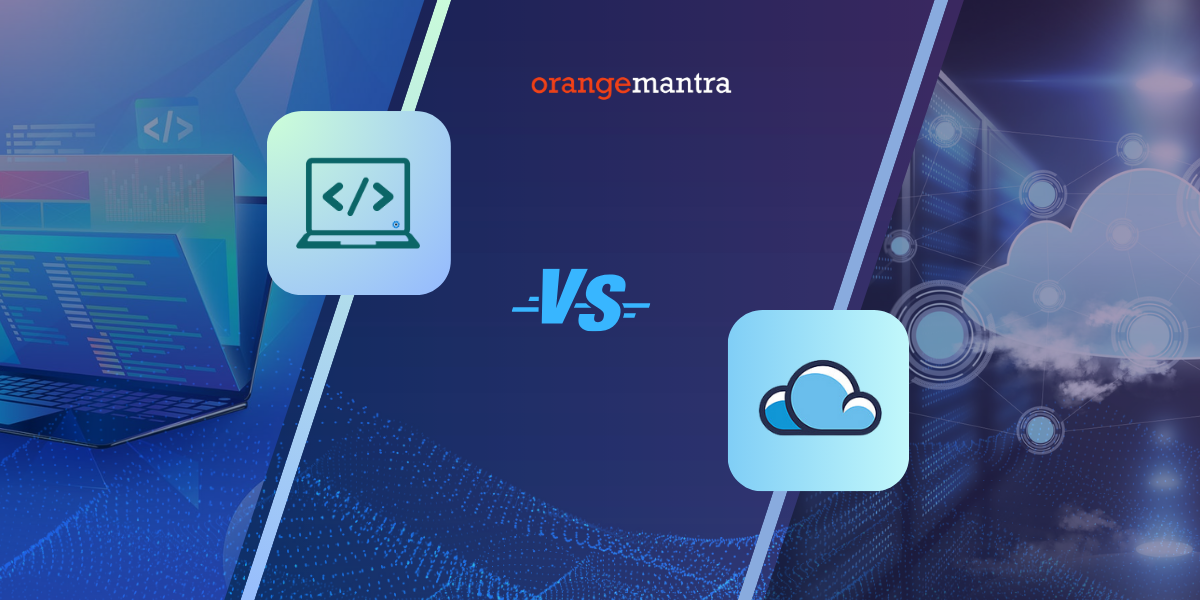
Here’s what you will learn:
Web apps are becoming incredibly popular among small businesses and large enterprises alike. Meanwhile, many companies are also using cloud apps due to outstanding features. While web apps offer incredible user experience, cloud apps provide scalability and security. But which kind of apps best suits your business requirements? Finding the right answer is not easy. You need to understand the strengths and weaknesses of both categories of apps.
Web apps can significantly increase customer engagement, boost conversions, and optimize your business processes. But you must not jump into the idea of web app development company if you haven’t analyzed the features of cloud apps yet. For some businesses, cloud-based applications are noticeably more useful than web apps. Whereas other businesses could benefit significantly from web apps. In this post, we will discuss the core capabilities of both web and cloud apps. We will also highlight the most striking attributes that differentiate the two categories of apps.
Table of Contents
Web Applications
Web apps, as the name suggests, are designed to run on web browsers. Users get a native app-like experience without installing any app. Web applications are developed using a combination of server-side code and user-side calligraphy. Developers use frameworks like PHP and .NET to build the backend while HTML, Adobe Flash, etc., for the frontend. Web apps enable users to install a shortcut to a website using web server components installed on the user’s device. With an internet connection, the apps would run seamlessly across browsers. Web apps are incredibly popular among online retailers, social media platforms, and streaming service providers, among others.
One of the downsides of web apps is their limited customization capabilities when compared with cloud-based apps. The latter category also offers more scalability.
Key features of web apps
- You can run a web app from any browser, on any device. You just need internet connectivity.
- Web apps are cross-platform by design. They run seamlessly across all devices and operating systems.
- Web applications require minimal support and maintenance. So, they help you reduce overhead costs.
- Unlike mobile app development services , users don’t need to install web apps on their devices.
- Also, web apps also don’t require updating since architecturally they’re more like websites.
Cloud-based Applications
Cloud-based apps rely on the evolution of web and cloud computing capabilities. Unlike web apps, cloud applications don’t rely on web browsers. One of the most popular capabilities of cloud apps is their unmatched flexibility.
Cloud apps are incredibly customizable and scalable. These attributes make them popular for enterprise mobility grade usage. Software integration, capability optimization, and seamless access are some of the most notable strengths of applications built in the cloud environment. Experienced cloud service providers can help you utilize all these benefits by hosting your applications on the cloud.
Cloud-based applications offer an array of advantages over web apps in terms of accessibility, cost, and scalability. Since these apps run on the cloud, you don’t need data storage space even for large-scale applications. Some of the most well-known cloud-based platforms include Dropbox, Salesforce, and Evernote.
Key features of cloud apps
- Cloud-based apps are location-agnostic since they are built in the cloud environment.
- Users can access cloud applications from any device or any location.
- With cloud solutions, you can easily scale your enterprise application without any hassle.
- Cloud solutions enable business continuity, by providing frictionless backup and data recovery.
- You can dramatically improve customer service by incorporating chatbots and other features into the cloud app.
It may surprise you to learn that more than 50 % of SMBs have trouble choosing between web and cloud applications to help them run their organizations. This choice often dictates how well a company can adjust to the needs of the market. With the speed at which technology is developing, selecting the best solution becomes essential. Making the correct decision can have a big influence on your bottom line, regardless of whether you want scalable infrastructure or a dynamic interface.
SMB Challenges in the Modern Era
SMBs often work with limited resources and have difficulties:
- Limited Resources: To stay competitive, SMBs usually manage tight budgets and staffing levels.
- Technology Integration: It might be difficult to adopt and use the appropriate technology without interfering with existing business activities.
- Scalability Requirements: As companies expand, there is a growing need for solutions that scale naturally.
- Issues with Data Security: One of the biggest challenges is maintaining data security while following regulatory guidelines.
These challenges highlight how crucial it is to choose web applications or cloud apps wisely since each meets different business requirements. These gaps may be successfully filled by working with a reputable cloud service provider or a trustworthy web app development company.
How OrangeMantra Meets the Needs of SMBs
We focus on developing customized solutions that tackle the main issues that SMBs encounter. They provide value in the following ways:
- Custom Web App Development: We create cost-effective, user-friendly, and responsive web apps that boost productivity. Their proficiency in developing web applications guarantees solutions that complement corporate objectives.
- Knowledge about Cloud Service Providers: We assist SMBs in moving their activities to scalable, secure platforms with less cost thanks to their proficiency in maintaining cloud infrastructures. Orangemantra is a reputable cloud service company that offers economical, effective solutions.
We use AWS Managed Service Solutions to provide managed services that guarantee dependable performance, secure data, and efficient operations.
Web Apps vs. Cloud Apps — Key Differences
While web and cloud apps share some structural similarities, functionally they’re different in many ways. From the technology frameworks to popular applications and cost, they differ strikingly.
Technology
Web apps use the most evolved capabilities of web technologies. They are written in powerful backend development frameworks, such as PHP, Python, and .NET. Web apps rely on a range of remote databases, including MySQL, SQL Server, etc. Besides, web apps use front-end development frameworks like JavaScript, JSON, and AJAX, among others.
Cloud apps rely on alternative databases and browser-based storage options. Cloud solutions are built in a highly scalable and secure cloud environment. Users can choose cloud options like AWS managed services and other cloud services.
Development cost
With the right web app development vendor, you can build a highly customized solution per your specific needs. Development costs are higher for web apps in comparison with cloud solutions. Besides, cloud-based applications offer immense flexibility and scalability. As your requirements grow, you can scale your cloud solution without spending a fortune.
Top 5 Trends in Web and Cloud-Based Applications
-
PWAs, or progressive web apps
PWAs provide quicker load times and offline capabilities by combining the finest aspects of online and mobile apps. PWA Development Company offers excessive coding talent for both platform like android and iOS .They are affordable and especially helpful for small and medium-sized businesses (SMBs) that want to create web apps to enhance their online visibility.
-
Strategies for Multiple Clouds
Nowadays, a lot of companies use a multi-cloud strategy, integrating services from many suppliers. This tendency improves overall dependability, guarantees flexibility, and lessens vendor lock-in. For this to be implemented successfully, working with a capable cloud service provider is essential.
-
Architectures without servers
By doing away with the requirement for server administration, serverless computing streamlines the deployment of applications. This strategy is becoming more and more common among SMBs that depend on platforms like AWS, whose managed service solutions guarantee smooth operation.
-
Including AI in Apps
AI is being used more and more in web and cloud-based services to analyze data, automate processes, and provide individualized user experiences. SMBs may increase productivity and make data-driven choices by integrating AI.
-
Improved Features for Cybersecurity
Particularly for SMBs, data breaches may have disastrous consequences. To protect sensitive data, web and cloud apps increasingly include sophisticated security features like data encryption, multi-factor authentication, and real-time threat detection.
Use cases
Cloud apps can fully or partially work even when the device is offline. Hence, they are useful for applications that require high computations. Cloud solutions are preferred for business processes that depend heavily on collaboration and data processing.
Web applications only run on a web browser. Internet connectivity is a must for web applications. Web apps are, therefore, more useful for transaction platforms such as eCommerce, and online booking.
Who Gets to Pick What? Cloud Apps vs Web apps
Web applications might be the best option if your company wants a straightforward and affordable way to handle internal procedures or client engagement. However, companies that need a lot of data storage and scalability should look at cloud apps.
Evaluate your present and future demands to make an informed decision. Consider things like money, operational complexity, and data security priorities. This choice may be guided by speaking with a cloud service provider or an expert in web app development.
Selecting the appropriate solution guarantees higher ROI, increased productivity, and effective resource management. The experience of web app developers or a reliable cloud service provider will be crucial whether you choose a custom web application or a reliable cloud-based solution.
Wrapping Things Up
The core technologies for both web and cloud apps are similar to a great extent. We can describe them as two different branches of evolution from the broader software development technologies. But their origins are quite connected to each other. After analyzing all the key features and capabilities, you will have a clearer picture of which technology suits your needs better. At OrangeMantra, we use both types of apps using best-in-class software tools and technologies. Our advanced web apps and deeply customized cloud solutions have powered businesses the world over.
FAQs
-
How much does it cost to build a web app?
The costs of developing a web app depend on several factors. Design complexity, development time, type of features, etc., play a vital role in calculating the costs. OrangeMantra builds impeccable web apps at a competitive price. -
How long does it take to develop a web app?
There’s no predefined time for developing a web app. It varies widely depending on the features of the app and its design. The best way to know an estimated time is to consult development experts. We deliver flawless web apps in a short development time. -
What is a cloud-based app?
Cloud-based applications rely on a mix of computer networks, storage, applications, or resources accessed through the internet or the provider’s shared cloud infrastructure. OrangeMantra offers a comprehensive range of cloud application development and hosting services. -
What does a progressive web app mean?
Progressive web apps are websites that look and feel like an app. PWAs use modern web capabilities to deliver an app-like experience. Users can access all information and capabilities without downloading a mobile app.





